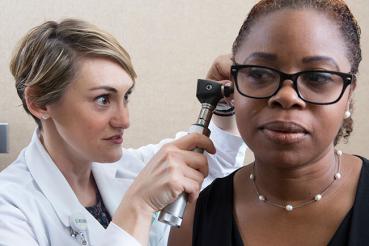Ankitaben Han, MD, a family medicine physician at RUSH Oak Brook, tells all of her patients to brush twice a day and floss once a day.
Giving these instructions might sound like a dentist's job — and it is. But primary care physicians, working closely with dentists and orthodontists, also have a role to play keeping your mouth healthy. "Your oral health can't be separated from your overall health," Han says.
Symptoms that appear in your lips, tongue, gums, throat and jaw often are connected to underlying conditions such as diabetes, substance use disorders or — less frequently — mouth (oral) cancer. The flipside is that treating the underlying condition can often relieve or prevent oral symptoms.
If you experience any of the following issues, or just want to avoid them, talking to your primary care doctor is a good place to start.
1. Oral thrush (candidiasis)
Thrush, or candidiasis, often appears as white patches on your tongue. A type of yeast infection, it's relatively uncommon in healthy adults. But it shows up frequently in babies, and in adults with the following risk factors:
- Conditions including diabetes, cancer, HIV/AIDS or Sjogren's syndrome
- Dentures
- Use of antibiotics or corticosteroids (including asthma medications)
- A history of smoking
- Frequent dry mouth
Doctors and dentists usually prescribe an antifungal medication to treat thrush. In many cases, your primary care doctor can also help you decrease your chance of getting thrush in the future. "For example, because high glucose levels in your saliva can contribute to thrush, controlling your diabetes can help prevent it," Han says.
2. Dry mouth
Every day, as long as you're healthy, you produce two to four pints of saliva. It helps you taste and digest food, keep your mouth clean, heal wounds in your mouth and more.
If your body stops making enough of it, you experience discomfort, pain, and a greater risk of infection and tooth decay, among other problems. While it's normal to occasionally have dry mouth when you're stressed — decreased saliva production is part of your body's fight-or-flight response — frequent dry mouth is likely a sign of an underlying problem.
Common causes include the following:
- Conditions such as diabetes, Parkinson's disease, HIV/AIDS and Sjogren's syndrome
- Many common medications, including blood pressure medicines and antidepressants
- Cancer treatments, including chemotherapy and radiation therapy
- Head or neck injury, which can lead to dysfunction of the salivary glands
- Use of methamphetamine or tobacco
If your frequent dry mouth is a side effect of a medication you need to take, your doctor may prescribe artificial saliva, which can keep you more comfortable. You can also do things on your own to increase saliva production, such as sucking on sugar-free candy, chewing sugar-free gum and drinking water. In many cases, though, treating the underlying condition or even trying a new medication can lead to relief.
While it's normal to occasionally have dry mouth when you're stressed, frequent dry mouth is likely a sign of an underlying problem.
3. Mouth or jaw pain
Pain in your mouth or jaw can have a wide range of causes. It's often due to infection or tooth decay. But it can also, sometimes, signal more serious problems.
Heart disease, for example, sometimes causes pain in the lower left side of the jaw. If you have pain in this area, especially if it gets worse when you're exercising or otherwise exerting yourself, see your doctor right away.
Even if your mouth pain is in a different area, or isn't a significant bother, it's worth mentioning. "If you experience anything out of the ordinary, talk to your primary care doctor," Han says. "They can help you get to the root of the problem."
4. Mouth cancer symptoms
One of the rarest and most serious problems is mouth cancer, or oral cancer, which can appear in the tongue, lips, gums, roof or your mouth or elsewhere. It's not common, but having human papillomavirus (HPV) or a history of smoking increases your risk.
Symptoms may include the following:
- Leukoplakia (a type of white patch that looks similar to thrush but is less common)
- Difficulty swallowing or moving your tongue
- Sore throat that doesn't go away
- A lump, sore or thickening in the throat, lips or mouth
- Ear pain
- A change in voice
Having these symptoms doesn't mean you definitely have mouth cancer, but if you have any of them you should talk to your doctor right away.
How to keep your mouth — and yourself — healthy
The best ways to keep your mouth healthy are also the best ways to keep yourself healthy:
- Eat a balanced diet.
- Exercise (at least 30 minutes of moderate physical activity most days of the week).
- If you have diabetes, make sure your blood sugar is under control.
- If you smoke, stop. (Rush offers smoking cessation classes for those who want help leaving cigarettes behind.)
There are also, of course, a few steps you can take that are specific to your oral health. As Han — and, chances are, your dentist — would advise: "Brush your teeth twice a day. Floss once a day. See the dentist at least once a year. Your mouth, and the rest of your body, will thank you."




